Meet an Educator is a monthly series by Early Bird, where we feature the work of educators across India who are actively spreading the joy of birds and nature. This month’s featured educator is Maria Antony P, a nature educator at ATREE’s Agasthyamalai Community Conservation Centre (ACCC) in Manimutharu, Tamil Nadu.
Do tell us about yourself, where you are from, and your work
I live in Nagercoil, a small town at the southernmost tip of the Indian peninsula. I hold a Bachelor’s degree in Zoology and Education, and a Master’s in Wildlife Biology from AVC College (Mayiladuthurai, Tamil Nadu). For my dissertation I studied the ecology of the Black Kite (Milvus migrans). Birds, spiders, insects and other ‘creepy-crawlies’ that are found on the seashore, in ponds, mangroves, wetlands and even paddy fields fascinate me. I love to spend time with children in the outdoors. Over time, connecting young minds to nature has become my passion. I like to kindle a spirit of discovery in children while inculcating values of nature conservation. I have been working formally and informally as an educator for over 15 years now. Currently, I am a Nature Educator at ATREE’s Agasthyamalai Community Conservation Centre (ACCC) at Manimutharu, Tamil Nadu. I draw on my skills in digital illustration, painting, caricature, storytelling, nature photography and my background in wildlife biology to design innovative conservation education programmes.
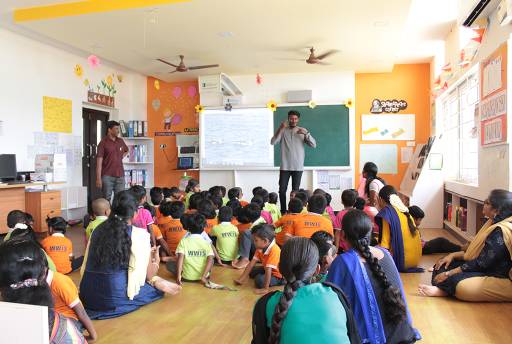
Are you a birder? What about bird watching excites you?
Observing bird behavior, learning about their natural history, and photographing them excites me. In my early teens, I would spend my weekends cycling 15 kilometers to the Manakudy Mangroves and Puthalam Saltpans. Armed with a pair of binoculars and my field notes, I would spend hours watching little Sandpipers, swifty Terns, busy Plovers and elegant Flamingos. Long afternoons were spent in making meticulous notes and sketching ducks, parakeets, woodpeckers and barbets at the Thathaiyar Irrigation Tank. Now, when I go birding with children, I encourage them to listen to the bird call, note distinguishing features, flight patterns and other interesting behavior and try nature journaling on the field. I feel that this helps children truly value and enjoy a sighting instead of just spotting a bird and ticking it off a checklist.
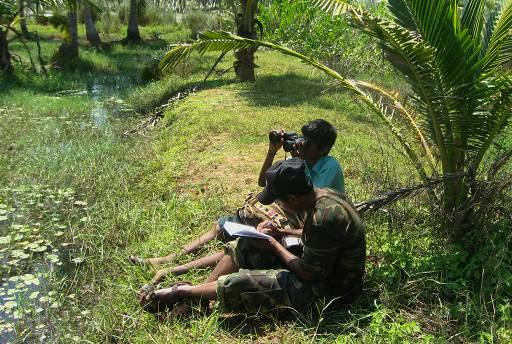
When and how did you get interested in bird/nature education?
It was my mother who first nurtured my love for nature. She would often share her observations of nesting Bulbuls and their parental care, Bushchats in the tea plants, Lorikeets in the guava trees, Pit vipers among the cardamom plants, and stories about wild boar, porcupine and mouse deer from her days at the Pambanar Tea estate (Idukki District, Kerala). A highly inspiring bird watching trip from school with Dr Robert B Grubh, a renowned ornithologist, and Shailaja R Grubh, first Nature Educator at BNHS was a life-changing experience. They took us 8th graders on a nature trail to the wetlands of Suchindram-Theroor-Manakudy and spoke to us about wetland birds and macro invertebrates. I was enthralled. There was no looking back. Dr. Grubh became my guru and I strove to learn from his knowledge of birds and his methods of nature education. I was fortunate to be guided by him for my undergraduate project as well. I wish to lead youngsters into the world of nature, just as they lead me.
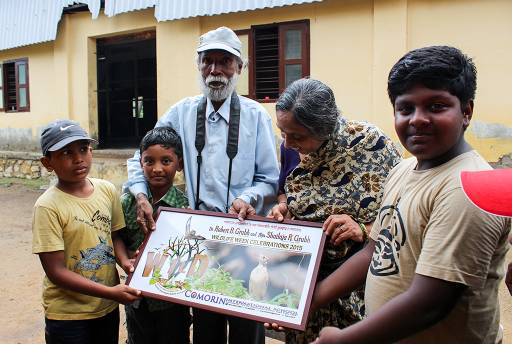
to my Gurus, Dr Robert B Grubh and Shailaja R Grubh at the end of a nature walk. Photo Courtesy: Maria Antony, 2015
What do you hope to achieve through your education work?
I believe in nurturing empathy for the environment while instilling values of nature conservation in children. I’m hopeful that such an investment will nudge children to develop a healthy self-esteem and become responsible citizens who can make environmentally sound decisions, take action and become ambassadors of nature conservation in the future.
Why do you believe it is important for children to learn about birds or connect with nature?
Connecting with nature through birding and other activities helps build the all-important emotional connection with the living world. It helps children gain an understanding of ecological principles and develop an eco-friendly attitude. Besides, birding very effectively cuts down screen-time and increases attention span and focus, which is a challenge with kids these days.
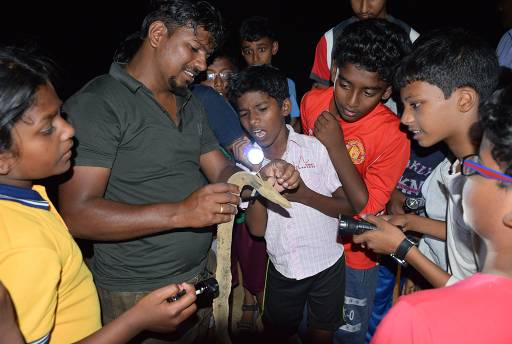
What tools or resources have helped you in teaching about birds?
Our conservation education ‘tool kit’ consists of modules developed from our work at ATREE’s ACCC. It involves:
- organizing storytelling and guest lectures in schools,
- conducting field trips, workshops and short courses,
- organizing quiz contests, art competitions and games,
- celebrating environmentally important days, and
- initiating and running Nature Clubs in schools and ‘Green Brigades’ in villages.
We have found that incorporating a variety of activities such as nature cycling, bird-watching, short-film making, walking nature trails, beachcombing, drawing, painting and residential nature camps works well.
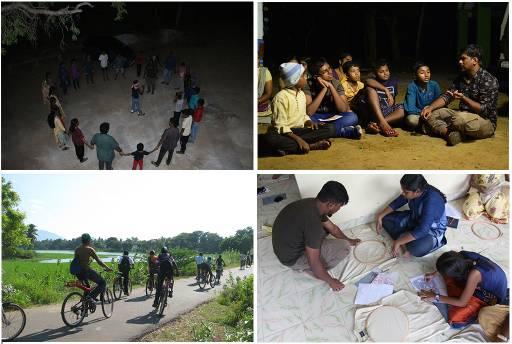
We take inspiration from teaching resources available in India and worldwide to design our own context-specific education material. We also use tools such as NCF’s Early Bird Flashcards in our programmes. Using these teaching aids, we introduce various flora and fauna, educate participants about the local biodiversity and its importance, and sensitize them to take ownership of their environment.
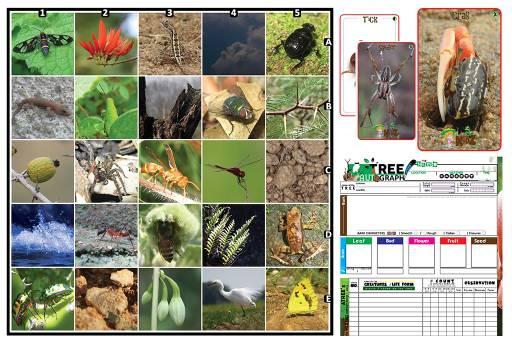
Have you encountered a significant challenge as a bird/nature educator, how did you overcome it?
When I entered the field of conservation education 16 years ago, resources were minimal, or, at least, I was ignorant of available resources. A desperate need to create visual resources for my first Nature Club forced me to learn to use designing software such as Adobe Photoshop, InDesign and Flash. I was finally able to create the visually impactful posters, PowerPoint slides, hand-outs and logos that I had always wished for. This helped a great deal in creating and sustaining interest in students. Convincing the school management and parents for permission to take children on field trips and nature-camps was very challenging initially. Catchy education material designed using photographs taken from similar events that we had conducted in their own school campuses helped build their interest. Only after forging collaborations with various government and non-governmental organizations was I able to run programmes smoothly. As a Nature Educator in ATREE’s ACCC, I am now able to organize and lead education programmes and initiatives with ease. I am indebted to my beloved mentors Dr T. Ganesh, Dr R. Ganesan and Dr M. Soubadra Devy for their expert guidance and advice, and to my colleagues, M. Mathivanan, A. Saravanan, S. Thamizhazhagan, and S. Thalavaipandi for their strong support.
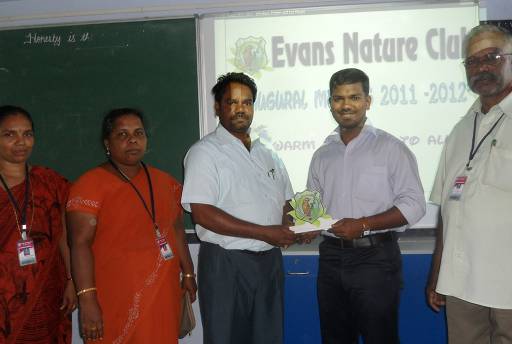
Do share any memorable moment or experience you have had in teaching kids about birds/nature.
ATREE’s ‘Wetland ROVERS of Tamiraparani’- a year long, field-based wetland education programme initiated in 2019 for grades 6 – 9, funded by TVS Brakes India Ltd. was one of the most exciting programs that we visualized, designed and organized. Over 60 students and 30 teaching staff members were selected to attend ROVERS. The participants got an opportunity to travel along River Tamiraparani, right from its point of origin to its confluence with the Bay of Bengal, and witness first-hand the varied forms of life supported by the river.
We started our journey from the ‘collecting zone’ of the river, high in the mountains, then visited the ‘transporting zone’, where participants explored the irrigation tanks and paddy fields of the Tamiraparani basin, and completed our journey at Punnakayal Estuary, the ‘dispersing zone’ of the river. Through lectures, games, art and craft activities, and hands-on ecological field experiments, I witnessed the students appreciate various life forms, identify more than 50 plants species and over 300 animal species including macro-invertebrates, crabs, fishes, frogs, migratory and residential terrestrial and wetland birds, learn about their natural history, and express the urge to conserve them. This made the programme memorable for the students, teachers, my team and me.
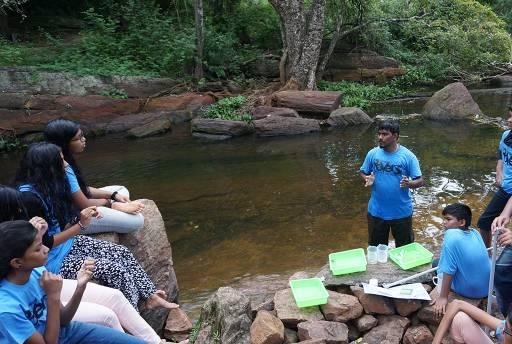
Have you noticed any changes in your learners after they received exposure to birds and nature-based learning?
I notice immediate changes in the behavior of children even after a one-day birding event or nature trail. Students who were initially hesitant or disinterested to take part in a nature camp show unwillingness to go back home. They ask their drivers to drive carefully through the Ghat roads as they are home to ‘creepy-crawlies’. They stop to admire a dead tree as they recognize that it is home to several creatures. Many of the learners who have had a more long-term association with me through nature clubs are continuing their engagement with nature as a bird researcher and consultant at Wetlands Authority of Tamil Nadu (@prasanthsoluna); as a herpeto-fauna researcher (@dhaarun_dina_27), as a wildlife photographer (@shiva_kumar_shiv), as a biologist (@jude_judyy), as a Forest Range Officer (@jinoblessil) and a nature enthusiastic teacher (@sritha).
What message would you have for your fellow educators, or somebody starting out in their nature education journey?
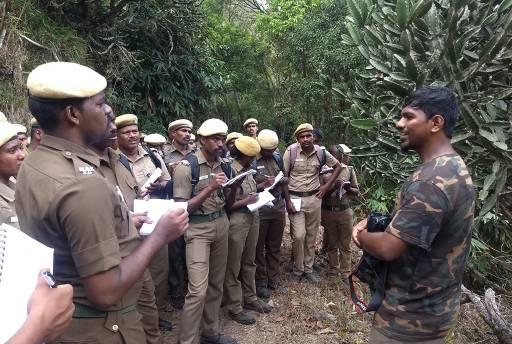
As conflicts over natural resources increase, there is a pressing need for quality nature education. I urge educators to design every event or programme with a unique and novel approach. Using audio/visual teaching-learning material can be a game changer. Story-telling is a powerful tool that grown-ups enjoy too! Try to provide learners with access to gadgets such as binoculars, spotting scopes and hand lenses whenever possible. Insist that they make notes instead of feeding their observations into mobile phones. Allow them to be adventurous to the extent that safety standards allow. Never give up on slow learners in the group. Follow-up with the participants through teachers or parents and encourage them to make a report in written, illustrated, audio or video form. Always teach from the heart and facilitate learners to ask questions and make their own observations. Let’s join-hand in conservation education.

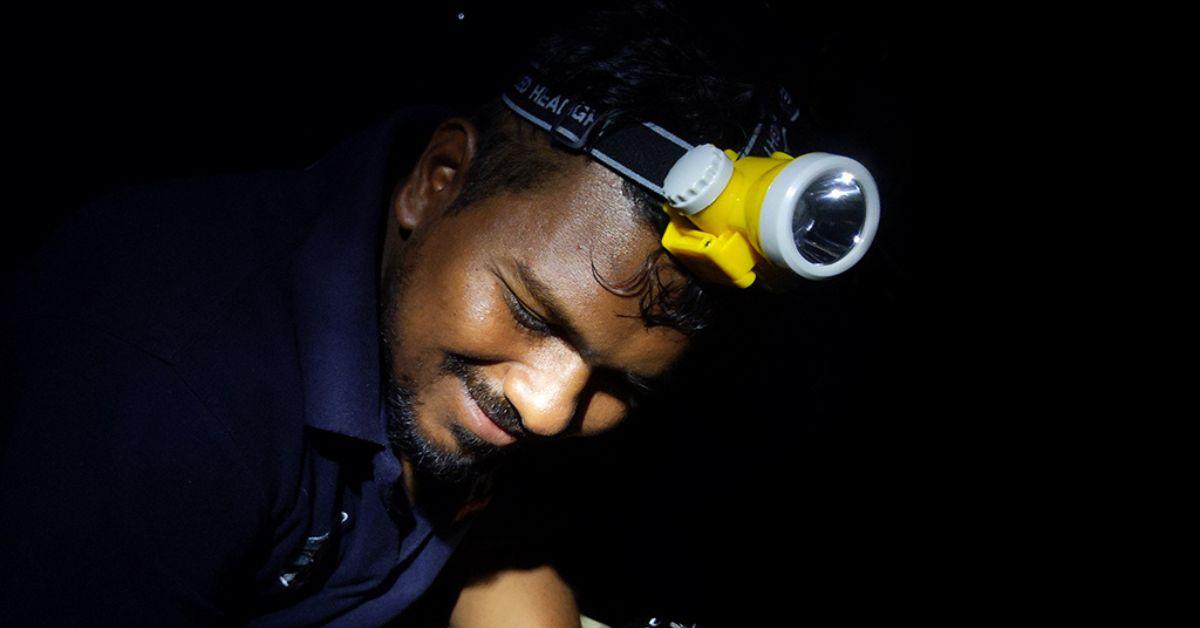
Tamil language la sonna engalukkum puriyum …
I love the way you explain about thing around us.
We always love to travel with you and learn more about Nature. Every Step with you is a great learning experience.